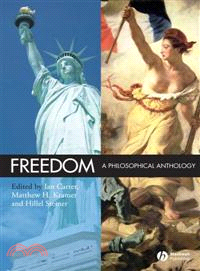Freedom - A Philosophical Anthology
商品資訊
ISBN13:9781405145046
出版社:John Wiley & Sons Inc
作者:Carter
出版日:2006/12/18
裝訂/頁數:平裝/528頁
規格:24.8cm*17.8cm*1.9cm (高/寬/厚)
定價
:NT$ 3248 元優惠價
:90 折 2923 元
庫存:1
下單可得紅利積點:87 點
商品簡介
作者簡介
名人/編輯推薦
目次
相關商品
商品簡介
Edited by leading contributors to the literature, Freedom: An Anthology is the most complete anthology on social, political and economic freedom ever compiled.
Offers a broad guide to the vast literature on social, political and economic freedom.
Contains selections from the best scholarship of recent decades as well as classic writings from Hobbes, Locke, Rousseau and Kant among others.
General and sectional introductions help to orient the reader.
Compiled and edited by three important contributors to the field.
Offers a broad guide to the vast literature on social, political and economic freedom.
Contains selections from the best scholarship of recent decades as well as classic writings from Hobbes, Locke, Rousseau and Kant among others.
General and sectional introductions help to orient the reader.
Compiled and edited by three important contributors to the field.
作者簡介
Ian Carter is Associate Professor in Political Philosophy at the University of Pavia, Italy.
Matthew H. Kramer is Professor of Legal and Political Philosophy at Cambridge University; Fellow of Churchill College, Cambridge; and Director of the Cambridge Forum for Legal and Political Philosophy.
Hillel Steiner is Professor of Political Philosophy at the University of Manchester.
Matthew H. Kramer is Professor of Legal and Political Philosophy at Cambridge University; Fellow of Churchill College, Cambridge; and Director of the Cambridge Forum for Legal and Political Philosophy.
Hillel Steiner is Professor of Political Philosophy at the University of Manchester.
名人/編輯推薦
"Those of us who work in moral and political philosophy owe a great debt of gratitude to the editors for taking such care in assembling this wonderful anthology. This is easily the best, most exhaustive collection on Freedom with which I am familiar." Christopher Wellman, Washington University in St Louis
"Among the main themes of this superb collection is that freedom has many dimensions, and among the many conditions of securing it is a willingness not to exaggerate the importance of securing everything. Every college should teach a course on freedom and its prerequisites, and Freedom: An Anthology would serve admirably as a primary reference text." David Schmidtz, University of Arizona
"Among the main themes of this superb collection is that freedom has many dimensions, and among the many conditions of securing it is a willingness not to exaggerate the importance of securing everything. Every college should teach a course on freedom and its prerequisites, and Freedom: An Anthology would serve admirably as a primary reference text." David Schmidtz, University of Arizona
目次
Preface.
Acknowledgements.
General Introduction.
Part I. Negative and Positive Freedom.
Introduction.
1. Thomas Hobbes, Leviathan (1651).
2. Jeremy Bentham, Of Laws in General (1782).
3. Jean-Jacques Rousseau, The Social Contract (1762).
4. Immanuel Kant, The Metaphysics of Morals (1797).
5. Benjamin Constant, The Liberty of the Ancients Compared with That of the Moderns (1819).
6. G. W. F. Hegel, The Philosophy of Right (1821).
7. Karl Marx, On the Jewish Question (1844).
8. Thomas Hill Green, Of the Different Senses of “Freedom” as Applied to Will and to the Moral Progress of Man and Lectures on the Principles of Political Obligations (1882).
9. Guido De Ruggiero, The History of European Liberalism (1925).
10. Isaiah Berlin, Two Concepts of Liberty (1969).
11. J.P. Day, On Liberty and the Real Will (1970).
12. Gerald C. MacCallum, Jr., Negative and Positive Freedom (1967).
13. John Rawls, A Theory of Justice (1971).
Part II. Freedom, Government and Arbitrary Power.
Introduction.
14. Nicolò Machiavelli, Discourses (1531).
15. Thomas Hobbes, Leviathan (1651).
16. James Harrington, The Commonwealth of Oceana (1656).
17. John Locke, Two Treatises of Government (1690).
18. Charles de Secondat, Baron de Montesquieu, The Spirit of the Laws (1748).
19. Isaiah Berlin, Two Concepts of Liberty (1969).
20. F. A. Hayek, The Constitution of Liberty (1960).
21. Philip Pettit, Republicanism (1997).
22. Quentin Skinner, Liberty before Liberalism (1998).
Part III. Freedom and the Mind.
Introduction.
23. Thomas Hobbes, Leviathan (1651).
24. J. S. Mill, On Liberty (1859).
25. Isaiah Berlin, Four Essays on Liberty (1969).
26. J. P. Day, On Liberty and the Real Will (1987).
27. John Gray, On Negative and Positive Liberty (1980).
28. Richard J. Arneson, Freedom and Desire (1985).
29. John Christman, Liberalism and Individual Positive Freedom (1991).
30. Charles Taylor, What’s Wrong with Negative Liberty (1979).
31. Christopher Megone, One Concept of Liberty (1987).
32. Richard Flathman, The Philosophy and Politics of Freedom (1987).
33. Matthew H. Kramer, The Quality of Freedom (2003).
Part IV. Freedom and Morality.
Introduction.
34. John Locke, Two Treatises of Government (1690).
35. Felix E. Oppenheim, Political Concepts (1981).
36. William E. Connolly, The Terms of Political Discourse (1993).
37. Robert Nozick, Anarchy, State and Utopia (1974).
38. G. A. Cohen, Illusions about Private Property and Freedom (1981).
39. S. I. Benn and W. L. Weinstein, Being Free to Act, and Being a Free Man (1971).
40. David Miller, Constraints on Freedom (1983).
41. Felix E. Oppenheim, Constraints on Freedom as a Descriptive Concept (1985).
42. David Miller, Reply to Oppenheim (1985).
43. Kristján Kristjánsson, Social Freedom (1996).
44. Richard Flathman, The Philosophy and Politics of Freedom (1987).
45. Hillel Steiner, An Essay on Rights (1994).
46. Matthew H. Kramer, The Quality of Freedom (2003).
Part V. Coercion.
Introduction.
47. F. A. Hayek, The Constitution of Liberty (1960).
48. Robert Nozick, Coercion (1969).
49. Robert Nozick, Anarchy, State and Utopia (1974).
50. G. A. Cohen, Self-ownership, Freedom and Equality (1995).
51. Hillel Steiner, An Essay on Rights (1994).
52. Christine Swanton, Freedom. A Coherence Theory (1992).
53. David Zimmerman, Coercive Wage Offers (1981).
54. Michael J. Gorr, Coercion, Freedom and Exploitation (1989).
55. Alan Wertheimer, Coercion (1987).
56. Serena Olsaretti, Liberty, Desert and the Market (2004).
Part VI. Autonomy.
Introduction.
57. Stanley I. Benn, A Theory of Freedom (1988).
58. Gerald Dworkin, The Theory and Practice of Autonomy (1988).
59. Onora O’Neill, Autonomy, Coherence and Independence (1992).
60. Janice Moulton and Francine Rainone, Women's Work and Sex Roles (1984).
61. Karl Marx and Friedrich Engels, The German Ideology (1846).
Part VII. Freedom, Ability and Economic Inequality.
Introduction.
62. F. A. Hayek, The Constitution of Liberty (1960).
63. Bruno Leoni, Freedom and the Law (1961).
64. Murray Rothbard, The Ethics of Liberty (1982).
65. John Rawls, A Theory of Justice (1971).
66. Philippe Van Parijs, Real Freedom for All (1995).
67. G. A. Cohen, Self-ownership, Freedom and Equality (1995).
68. Amartya Sen, Inequality Reexamined (1992).
Part VIII. Liberalism and the Value of Freedom.
Introduction.
69. J. S. Mill, On Liberty (1859).
70. J. S. Mill, On Liberty (1859).
71. Karl Popper, The Poverty of Historicism (1957).
72. F. A. Hayek, The Constitution of Liberty (1960).
73. Isaiah Berlin, Two Concepts of Liberty (1969).
74. John Rawls, Justice as Fairness. A Restatement (2001).
75. Joseph Raz, The Morality of Freedom (1986).
76. Amartya Sen, Inequality Reexamined (1992).
77. Thomas Hurka, Why Value Autonomy? (1987).
78. Joel Feinberg, The Interest in Liberty on the Scales (1978).
79. Ronald Dworkin, Taking Rights Seriously (1977).
80. Ian Carter, A Measure of Freedom (1999).
Part IX. The Measurement of Freedom.
Introduction.
81. Hillel Steiner, How Free: Computing Personal Liberty (1983).
82. Ian Carter, A Measure of Freedom (1999).
83. Prasanta Pattanaik and Yongsheng Xu, On Ranking Opportunity Sets in Terms of Freedom of Choice (1990).
84. Amartya Sen, Welfare, Freedom and Social Choice. A Reply (1990).
85. Robert Sugden, The Metric of Opportunity (1998).
86. Martin van Hees, Legal Reductionism and Freedom (2000).
Additional Writings.
Index.
.
Acknowledgements.
General Introduction.
Part I. Negative and Positive Freedom.
Introduction.
1. Thomas Hobbes, Leviathan (1651).
2. Jeremy Bentham, Of Laws in General (1782).
3. Jean-Jacques Rousseau, The Social Contract (1762).
4. Immanuel Kant, The Metaphysics of Morals (1797).
5. Benjamin Constant, The Liberty of the Ancients Compared with That of the Moderns (1819).
6. G. W. F. Hegel, The Philosophy of Right (1821).
7. Karl Marx, On the Jewish Question (1844).
8. Thomas Hill Green, Of the Different Senses of “Freedom” as Applied to Will and to the Moral Progress of Man and Lectures on the Principles of Political Obligations (1882).
9. Guido De Ruggiero, The History of European Liberalism (1925).
10. Isaiah Berlin, Two Concepts of Liberty (1969).
11. J.P. Day, On Liberty and the Real Will (1970).
12. Gerald C. MacCallum, Jr., Negative and Positive Freedom (1967).
13. John Rawls, A Theory of Justice (1971).
Part II. Freedom, Government and Arbitrary Power.
Introduction.
14. Nicolò Machiavelli, Discourses (1531).
15. Thomas Hobbes, Leviathan (1651).
16. James Harrington, The Commonwealth of Oceana (1656).
17. John Locke, Two Treatises of Government (1690).
18. Charles de Secondat, Baron de Montesquieu, The Spirit of the Laws (1748).
19. Isaiah Berlin, Two Concepts of Liberty (1969).
20. F. A. Hayek, The Constitution of Liberty (1960).
21. Philip Pettit, Republicanism (1997).
22. Quentin Skinner, Liberty before Liberalism (1998).
Part III. Freedom and the Mind.
Introduction.
23. Thomas Hobbes, Leviathan (1651).
24. J. S. Mill, On Liberty (1859).
25. Isaiah Berlin, Four Essays on Liberty (1969).
26. J. P. Day, On Liberty and the Real Will (1987).
27. John Gray, On Negative and Positive Liberty (1980).
28. Richard J. Arneson, Freedom and Desire (1985).
29. John Christman, Liberalism and Individual Positive Freedom (1991).
30. Charles Taylor, What’s Wrong with Negative Liberty (1979).
31. Christopher Megone, One Concept of Liberty (1987).
32. Richard Flathman, The Philosophy and Politics of Freedom (1987).
33. Matthew H. Kramer, The Quality of Freedom (2003).
Part IV. Freedom and Morality.
Introduction.
34. John Locke, Two Treatises of Government (1690).
35. Felix E. Oppenheim, Political Concepts (1981).
36. William E. Connolly, The Terms of Political Discourse (1993).
37. Robert Nozick, Anarchy, State and Utopia (1974).
38. G. A. Cohen, Illusions about Private Property and Freedom (1981).
39. S. I. Benn and W. L. Weinstein, Being Free to Act, and Being a Free Man (1971).
40. David Miller, Constraints on Freedom (1983).
41. Felix E. Oppenheim, Constraints on Freedom as a Descriptive Concept (1985).
42. David Miller, Reply to Oppenheim (1985).
43. Kristján Kristjánsson, Social Freedom (1996).
44. Richard Flathman, The Philosophy and Politics of Freedom (1987).
45. Hillel Steiner, An Essay on Rights (1994).
46. Matthew H. Kramer, The Quality of Freedom (2003).
Part V. Coercion.
Introduction.
47. F. A. Hayek, The Constitution of Liberty (1960).
48. Robert Nozick, Coercion (1969).
49. Robert Nozick, Anarchy, State and Utopia (1974).
50. G. A. Cohen, Self-ownership, Freedom and Equality (1995).
51. Hillel Steiner, An Essay on Rights (1994).
52. Christine Swanton, Freedom. A Coherence Theory (1992).
53. David Zimmerman, Coercive Wage Offers (1981).
54. Michael J. Gorr, Coercion, Freedom and Exploitation (1989).
55. Alan Wertheimer, Coercion (1987).
56. Serena Olsaretti, Liberty, Desert and the Market (2004).
Part VI. Autonomy.
Introduction.
57. Stanley I. Benn, A Theory of Freedom (1988).
58. Gerald Dworkin, The Theory and Practice of Autonomy (1988).
59. Onora O’Neill, Autonomy, Coherence and Independence (1992).
60. Janice Moulton and Francine Rainone, Women's Work and Sex Roles (1984).
61. Karl Marx and Friedrich Engels, The German Ideology (1846).
Part VII. Freedom, Ability and Economic Inequality.
Introduction.
62. F. A. Hayek, The Constitution of Liberty (1960).
63. Bruno Leoni, Freedom and the Law (1961).
64. Murray Rothbard, The Ethics of Liberty (1982).
65. John Rawls, A Theory of Justice (1971).
66. Philippe Van Parijs, Real Freedom for All (1995).
67. G. A. Cohen, Self-ownership, Freedom and Equality (1995).
68. Amartya Sen, Inequality Reexamined (1992).
Part VIII. Liberalism and the Value of Freedom.
Introduction.
69. J. S. Mill, On Liberty (1859).
70. J. S. Mill, On Liberty (1859).
71. Karl Popper, The Poverty of Historicism (1957).
72. F. A. Hayek, The Constitution of Liberty (1960).
73. Isaiah Berlin, Two Concepts of Liberty (1969).
74. John Rawls, Justice as Fairness. A Restatement (2001).
75. Joseph Raz, The Morality of Freedom (1986).
76. Amartya Sen, Inequality Reexamined (1992).
77. Thomas Hurka, Why Value Autonomy? (1987).
78. Joel Feinberg, The Interest in Liberty on the Scales (1978).
79. Ronald Dworkin, Taking Rights Seriously (1977).
80. Ian Carter, A Measure of Freedom (1999).
Part IX. The Measurement of Freedom.
Introduction.
81. Hillel Steiner, How Free: Computing Personal Liberty (1983).
82. Ian Carter, A Measure of Freedom (1999).
83. Prasanta Pattanaik and Yongsheng Xu, On Ranking Opportunity Sets in Terms of Freedom of Choice (1990).
84. Amartya Sen, Welfare, Freedom and Social Choice. A Reply (1990).
85. Robert Sugden, The Metric of Opportunity (1998).
86. Martin van Hees, Legal Reductionism and Freedom (2000).
Additional Writings.
Index.
.
主題書展
更多
主題書展
更多書展今日66折
您曾經瀏覽過的商品
購物須知
外文書商品之書封,為出版社提供之樣本。實際出貨商品,以出版社所提供之現有版本為主。部份書籍,因出版社供應狀況特殊,匯率將依實際狀況做調整。
無庫存之商品,在您完成訂單程序之後,將以空運的方式為你下單調貨。為了縮短等待的時間,建議您將外文書與其他商品分開下單,以獲得最快的取貨速度,平均調貨時間為1~2個月。
為了保護您的權益,「三民網路書店」提供會員七日商品鑑賞期(收到商品為起始日)。
若要辦理退貨,請在商品鑑賞期內寄回,且商品必須是全新狀態與完整包裝(商品、附件、發票、隨貨贈品等)否則恕不接受退貨。
























